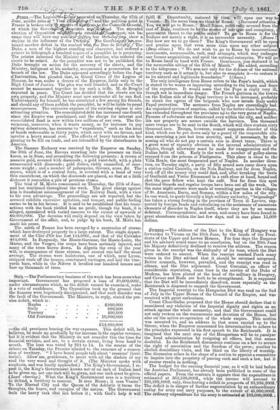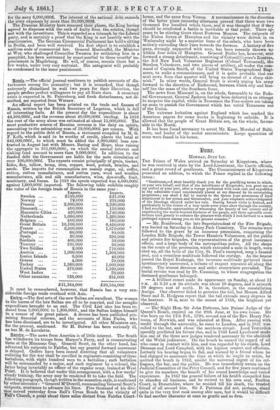The Imperial rescript to the Hungarian Diet was read on
the 2nd of July in the Upper House of the Council of the Empire, and was received with great enthusiasm.
Count Clam-Gallas proposed that the House should declare that it considered any violation of the Imperial dignity and rights as an attack against the whole monarchy, and that the Government could not only reckon on the concurrence and devotion of the House, but also on the active co-operation of the whole empire. This motion was assented to, and an address in that sense carried up to the throne, when the Emperor announced his determination to adhere to the principles expressed in his first speech to the Reichsrath. It is imagined that the next step of the Hungarians will be to paralyze the local administration by resigning all offices, but this seems doubtful. In the Reichsrath discussions continue on a law to secure the right of association and the freedom of the press; another to abolish domiciliary visits, and the third on the liberty of worship. The discussion arises in the shape of a motion to appoint a committee to inquire into the propriety of passing such and such a law, but it of course results in nothing. The budget for the ensuing financial year, as it will be laid before the Austrian Parliament, has already been published in some of the official papers. From the contents it appears that the expenditure is estimated at 362,536,0001, while the income will amount to 298,599,80011. only, thus leaving a deficit in prospeclu of 63,936,2001' The deficit is in danger of further augmentation by an extraordinary outlay for army and navy purposes, to the extent of 45,000,00011. The ordinary expenditure for the army is estimated at 103,000,000i ;
for the navy 6,000,00011. The interest of the national debt exceeds the army expenses by more than 20,000,0001
The Prussian Ministry have resumed their places, the King having agreed to dispense with the oath of fealty from the estates, though not with the investiture. This is regarded as a triumph by the Liberal party, and is certainly a proof that the King is not heartily with the reactionaries. The German. Commercial Parliament has held a sitting in Berlin, and been well received. Its first object is to establish a uniform code of commercial law. General Mauteuffel, the Minister at War, who challenged Councillor Twesten for criticizing him in a pamphlet, has been sentenced by court-martial to three months' im- prisonment in Magdeburg. He will, of course, remain there but a few weeks, under very easy restraint. His antagonist will probably be condemned to the same punishment.































 Previous page
Previous page